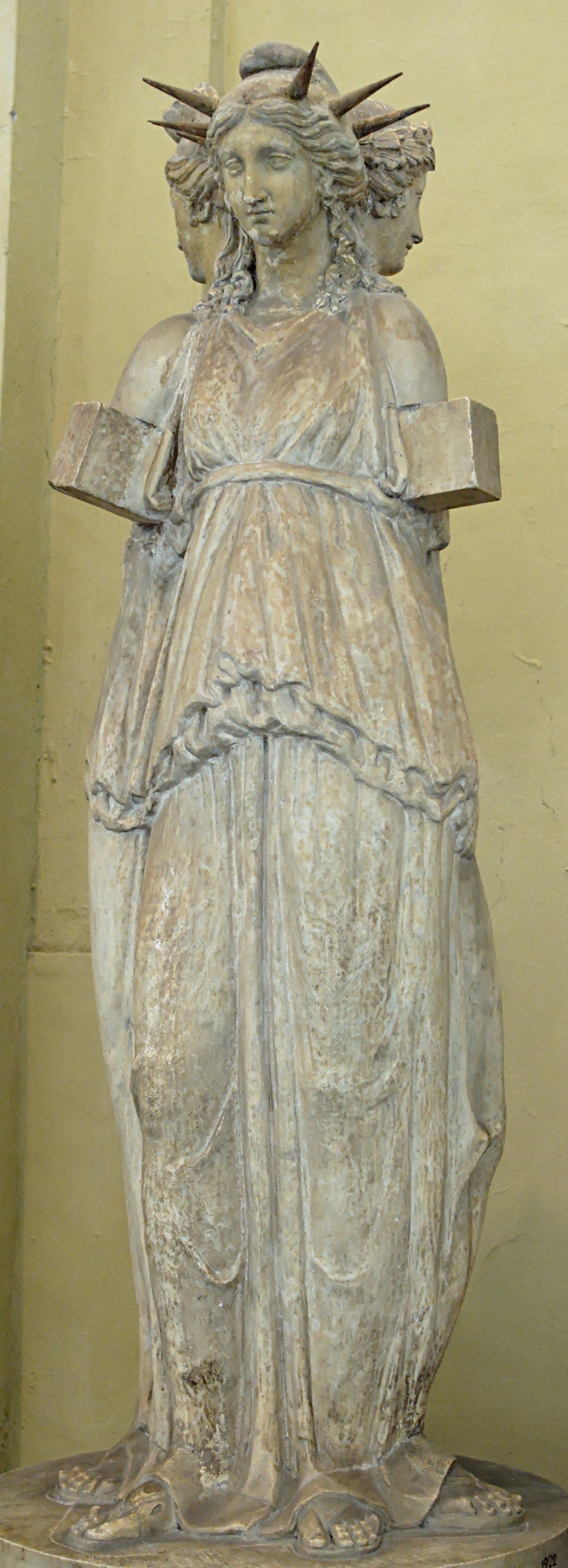
Hecate Art Digital Download Triple Goddess Greek Print Full Etsy in
According to ancient Greek religion, Hecate's divine duties were quite extensive. Most notably, Hecate is the goddess of witchcraft, magick, the moon, night, light, necromancy, and ghosts. Among Wiccans, Hecate is described as an entity that can cross from the physical world to the underworld with ease, a skill she inherited from her parentage.

Hecate the goddess of witchcraft, crossroads, and monster/beast folks
Hekate in ancient Greek religion by Von Rudloff, Ilmo Robert, 1960-Publication date 1999 Topics Hecate (Greek deity) Publisher Victoria, B.C. : Horned Owl Pub. Collection inlibrary; printdisabled; internetarchivebooks Contributor Internet Archive Language English. ix, 176 p. : 23 cm

Hecate Hekate Greek Goddess of Magic Statue Sculpture Bronze Finish 11.
Hecate or Hekate (/ ˈ h ɛ k ə t iː /; Ancient Greek:, Hekátē) is a goddess in ancient Greek religion and mythology, most often shown holding a pair of torches or a key and in later periods depicted in triple form. She is variously associated with crossroads, entrance-ways, light, magic, witchcraft, knowledge of herbs and poisonous plants, ghosts, necromancy, and sorcery.

εὐήλιος — A guide to worship of Hestia cheat sheets Greek Gods And
Hekate in Ancient Greek Religion provides an analysis of Hekate's nature and roles in the archaic period and, after doing so, suggests in conclusion that she played five major roles in early Greek religion: Propylaia, Propolos, Phosphoros, Kourotrophos and Chthonia (page 91). That a copy of the book was submitted to BMCR for review indicates that either the author or the publisher hopes to.

Ancient Greek Symbols, Sacred Symbols, Mystic Symbols, Pagan Symbols
Hekate in Early Greek Religion - Free download as Text File (.txt), PDF File (.pdf) or read online for free. Mitologija. Mitologija. Open navigation menu.. Lectura Ancient Greek Religion_OCR. Lectura Ancient Greek Religion_OCR. John Edwin López Suárez. 1530. 1530. Karen Aven. Hekate . Hekate . Lele Potrif. Divine Characters.

Hekate . The Goddess with three faces . Hecate goddess, Hekate, Hecate
Hecate is a goddess in ancient Greek religion and mythology, most often shown holding a pair of torches, a key, or snakes, or accompanied by dogs, and in later periods depicted as three-formed or triple-bodied. She is variously associated with crossroads, entrance-ways, night, light, magic, witchcraft, the Moon, knowledge of herbs and poisonous plants, graves, ghosts, necromancy, and sorcery.

Arte greca, Archeologia, Arte
Hecate was the ancient Greek goddess of witchcraft, necromancy, ghosts and crossroads. She had few temples in the ancient world but small household shrines--erected to ward off evil and the malevolent powers of witchcraft--were quite common. Her most important cult centres were those of Eleusis and the island of Samothrace where she was worshipped as an associate-goddess of the Mysteries.

Hekate_ is a Greek goddess, most often shown holding two torches or a
Within ancient Greek religion Hecate had many different roles, as goddess not just of witchcraft, but also of magic, spells, the night, ghosts, light, necromancy, and even the moon.. 1st to 2nd century AD Roman marble statuette of triple-bodied Hekate and the three graces. Shrines to Hecate were included at doorways or within home shrines.

Resultado de imagem para hekate altar Hecate goddess, Hekate, Hecate
Hecate was the ancient Greek goddess of magic, witchcraft, the night, moon, ghosts and necromancy. She was the only child of the Titanes Perses and Asteria from whom she received her power over heaven, earth, and sea. She was depicted as a woman holding a pair of torches. Her Roman name was Trivia.

Wooden Hecate Hekate Statue Greek Goddess Pagan Goddess Etsy Hecate
Hecate, or Hekate in ancient Greek, is a name that resonates with power and mystique. The origins of her name are somewhat debated, but one theory suggests it's derived from the Greek word "hekatos," meaning "worker from afar.". Hecate was a significant figure in ancient Greek religion. Se was revered not just for her roles in.

Hekate Chant Gain Her Powerful Blessing Hekate, Chants, Hecate goddess
Hecate, like many of the other non-indigenous Greek gods (including Dionysus, Demeter, and Artemis), had a wide range of meanings and associations in the mythic and religious beliefs and practices of the ancient Hellenes. She, in particular, was associated with nature and fertility, the crossroads, and (later) death, spirits, magic and the moon.

"Hekate", Nekronikon Goddess art, Hekate, Hecate
Hekate in Ancient Greek Religion by Ilmo Robert Von Rudloff. 0 Ratings 20 Want to read; 0 Currently reading; 1 Have read; Hekate in Ancient Greek Religion. Edit. The book covers both how much and how little is known about the goddess Hekate, drawing from both the archeological record and from literature. The author also covers the cultures in.

hecate. [digimagicnb] Hecate, Hekate, Hecate symbol
The goddess had unusual rituals performed in her honour in the Greek religion, which include the offerings of food - given at crossroads, road junctions, and any other sort of boundary or threshold - known as 'the supper of Hecate'.These took the form of small cakes of eggs, cheese, bread, and dog meat, which were lit with miniature torches or, alternatively, a dish of red mullet, which.

Hécate Hekate, Ancient goddesses, Triple goddess
Hekate is a deeply important goddess in the Greek tradition and in other paths that honor her. For this reason, I have translated the entry on Hekate from the rare Greek collection from the 19th.

Wooden Hecate, Hekate statue, Greek goddess, pagan goddess, wiccan
This article reimagines the archetype of Hekate, ancient Greek deity, through the framework of memoir writing. Situated at the threshold, crossroads, and her cave, Hekate's triune form presides over. Expand

Hekate Greek Mythology Wiki FANDOM powered by Wikia
Well, Hekate according to Greek God geneaology, existed well before Artemis and Apollo, the former being inexplicably tied with Hekate by the 4th and 5th centuries. Instead of accepting this FACT as solid evidence of widespread worship of Hekate as a major deity, he quickly denounces the name "Hekatos" given to Apollo as a fluke..